IKEA Secrets Straight From Employees Themselves
IKEA is one of the more well-known furniture stores in the world, thanks to its massive warehouses and wide variety of products. As popular as the company is, there are some things you could only know by being an employee. As the world's largest furniture retailer, you can bet they have a few tricks up their sleeve to keep things running smoothly and sales as high as they can be. From the carefully calculated layout to the store codes, these IKEA secrets help to explain the company's massive success.
The Design Is Meant To Make You See Everything

IKEA stores are an average of 300,000 square feet! With all of that space, you could easily miss out on a large percentage of the merchandise. To prevent this from happening, the interior design is set up like a maze.
Have you ever found yourself looking for one thing but passing through absolutely every section in IKEA on the way to it? That's because of something employees refer to as the "Long Natural Way." The term describes the path that the customer is steered down by the way everything is set up.
They Don't Want You To Unpackage Things

IKEA is characterized by its willingness to let customers interact with all of the products. From laying in their beds to opening cabinets, the store is designed to feel like you're at home.
That being said, they don't want you to feel so comfortable that you start taking things out of their packaging. The model items are out for a reason. The minute you take something out of the package, there's a possibility it won't be able to be sold.
They Are Instructed Not To Bother You
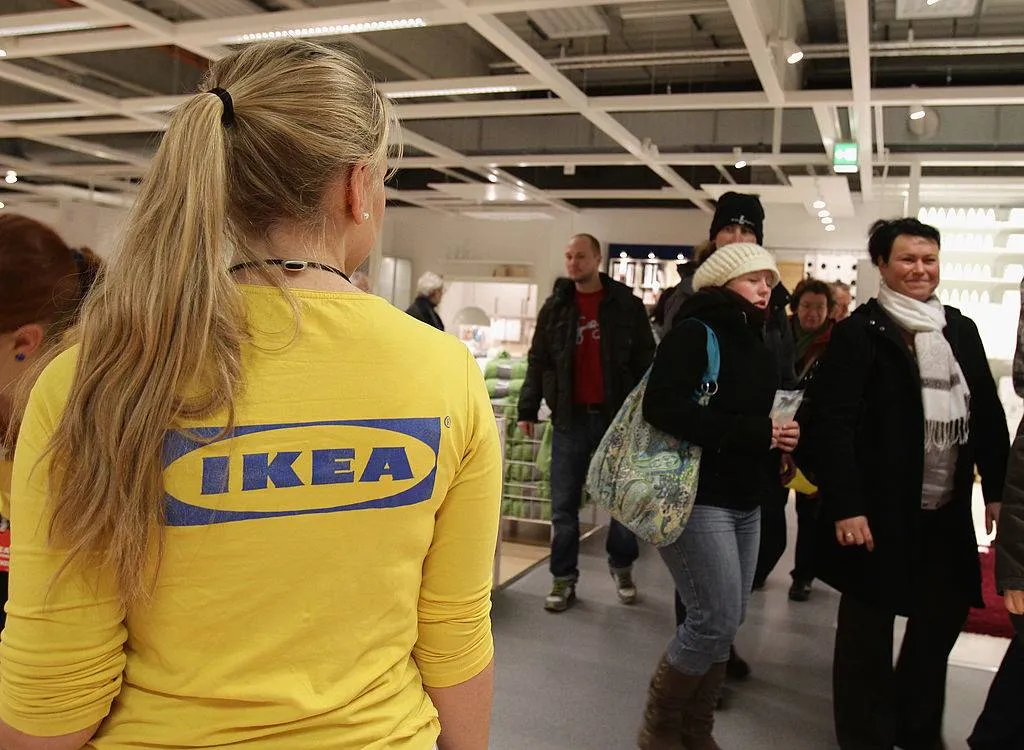
Typically when you walk into a retail store, you can feel the eyes of employees on you as they ask that loathed question, "Is there anything you're looking for today?" You won't have this experience at IKEA.
To the contrary, IKEA employees are taught to only help customers when asked. By being less intrusive, customers can more freely experience the products. Plus, having to walk through all of those products tempts the customer enough, so workers don't need to worry about upselling.
Customers Sometimes Buy Entire Rooms

One of the most significant selling factors that IKEA implements is having the majority of their stores set up in rooms. This makes it easy for the customer to imagine the items in their home. The technique is so successful that some patrons will buy entire rooms.
Let's say that someone just moved into a home with an extra room or is doing a complete redesign. If they are starting from scratch and love a display room, they might just buy all of the furniture and accessories!
Display Books Often Come From Employees

If you do buy an entire display room, one thing that won't be included is the books on the shelves. That's because they often times are borrowed from the employees! Typically the store will ask workers to bring in books that match a certain color scheme.
The books also have to be appropriate, so they can't have anything controversial or otherwise offputting to the customer. The idea is to make the room look as complete as possible so it seems as though someone could actually live there.
There Are Shortcuts But They Get Rearranged Frequently
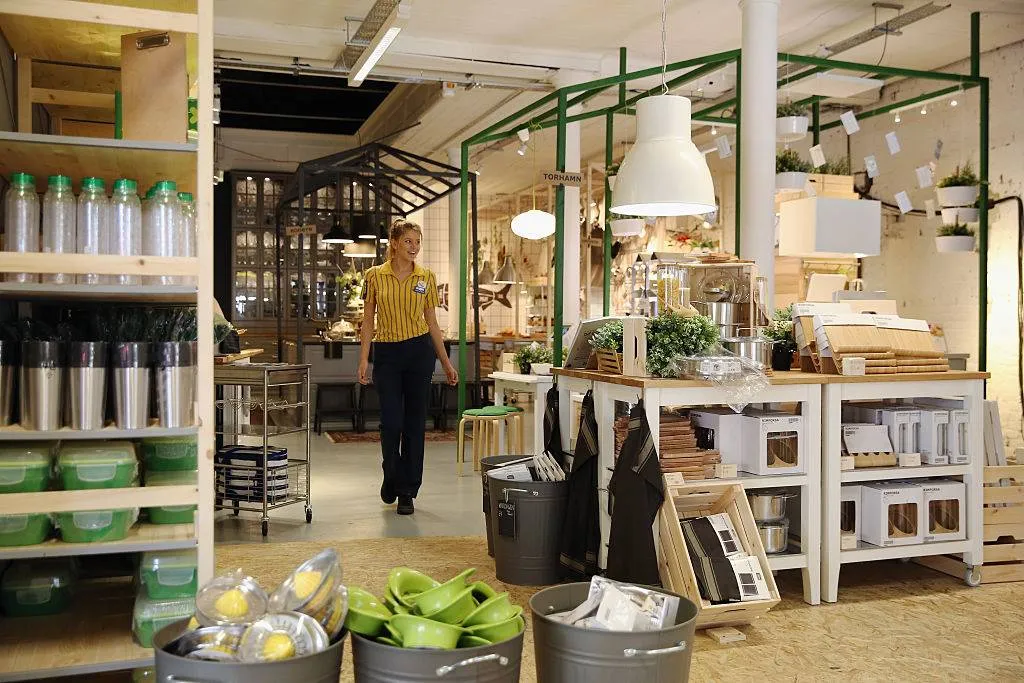
IKEAs are easy to get lost in, so it can be difficult to stray from the "Long Natural Way" that we mentioned earlier. Fortunately, there are shortcuts all over the place, so employees can easily guide you to your destination if needed.
That being said, they change up the shortcuts every so often so that frequent patrons don't get used to them. This way, everyone sees as many products as possible every time they shop.
The Walls Are On Rollers
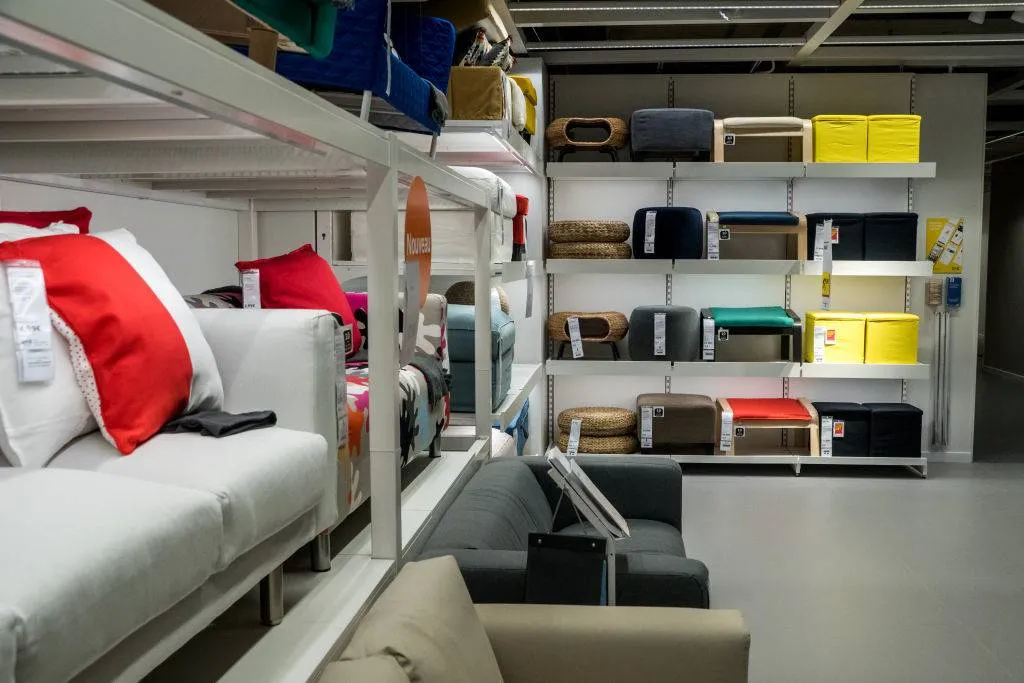
If you've never paid particularly close attention to the walls separating each room in IKEA, you may not have noticed that they're on rollers. It's similar to the kind of sliding doors that some closets have. The design makes it easy for employees to rearrange the floor design.
At the end of the day, employees will often move all the doors out of the way to make it easier to stock up, take out trash, clean, etc. During the day, the doors have a lock mechanism that prevents customers from messing with them.
They Have An Impulse Buy Section

Many stores have inexpensive sections in their store, such as Target's Dollar Spot (aka Bullseye's Playground). In IKEA, this impulse buy area is called their "Open The Wallet" section. It consists of cheap but practical items like hangers or tealight candles.
The idea is that if you're going to buy something from IKEA, you'll be extra tempted to add to your purchase a few inexpensive items. It's the kind of "may as well" logic that has customers buying either a lot or nothing at all.
They Stock Items Extra High On Purpose

If you've been to an IKEA recently, you may recall the bins looking extra stuffed. That's due to something employees call the "bulla bulla" technique. It entails piling items to complete capacity so that the bins look extra voluminous.
The idea is that the more overflowing something looks, the less expensive it seems. It's kind of like the idea of supply and demand. It's there's a surplus of supply, then people will subconsciously assume there's little demand and therefore think the price must be low.
You're Allowed To Nap In Their Beds

In China in particular, people are often photographed napping in IKEA beds. Though it may seem like an outlandish thing to do, employees are completely okay with it. Seeing people nap encourages other shoppers to interact with the merchandise, which makes them more likely to buy.
Furthermore, you're more likely to buy a bed that literally caused you to pass out. Employees will have to eventually wake you up, but not for a few hours or until closing time.
The Serial Codes Correspond To Item Color
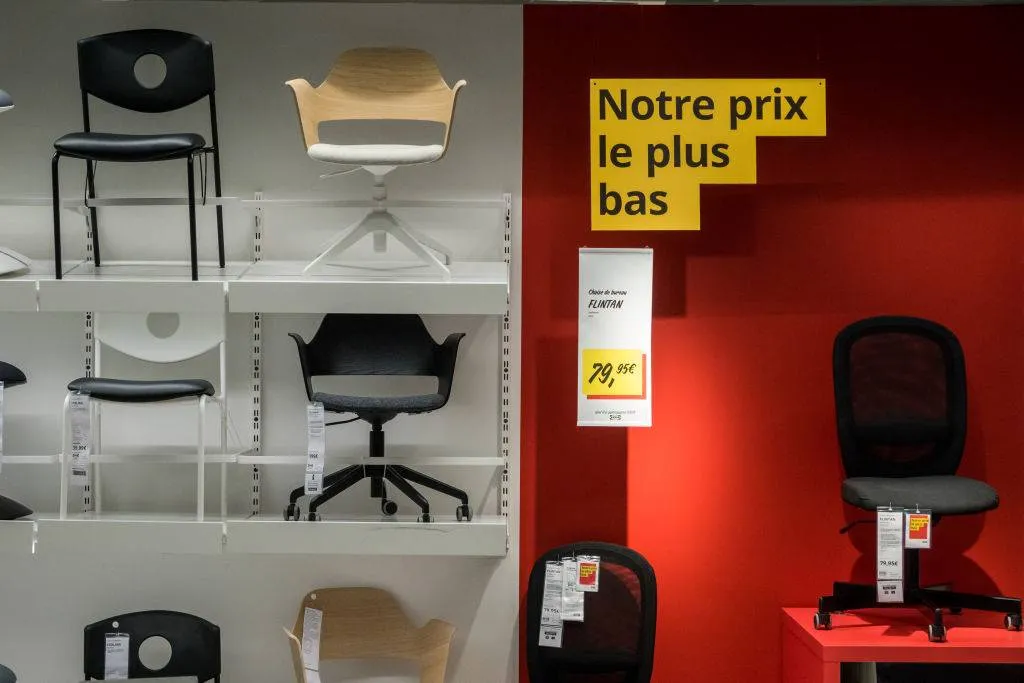
One former IKEA employee told Mental Floss that the serial numbers offered information about the item. He explained, "The last two numbers would tell you what color the item was. So let's say if it ended in 40, it was blue. That would mean the 4 range was blue, so 41 might be light blue, and 42 would be dark blue."
Since the rooms are designed with color schemes, knowing these serial number meanings could be helpful when returning or arranging items.
The Item Names Have Themes

With all of the thousands of products kept in the IKEA warehouse, it's no surprise that each item category has its own name. What is surprising is that these names have themes.
So for example, bookcases tend to be named after professions, while bathroom products are named after Swedish bodies of water. The idea was implemented by the founder of IKEA, who had dyslexia and used the system to help him remember the item names.
Couples Often Fight In The Store

When it comes to picking out furniture, it's the ultimate test of a relationship. Apparently, couples argue in the store all the time. One employee told Mental Floss, "I had a couple trying to make a decision on a rug, and he was mad, and she was on the verge of tears."
These arguments are so frequent that the design spokesperson for IKEA US wrote a list of guidelines for couples who are planning a store visit.
Employees Love To Play Games After Hours
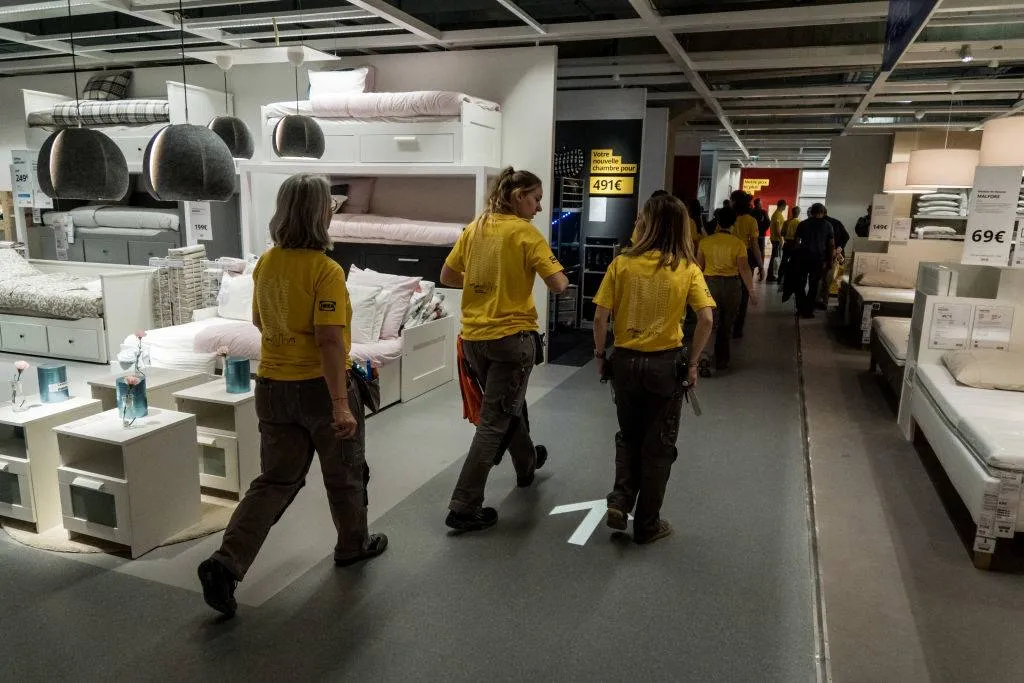
One IKEA employee told Mental Floss, "At the end of the night, they'd open all the walls, and we'd have a big empty space, and there would be pallet jack races." Another popular game among employees was hide-and-seek.
Sometimes, they'd have no idea they were playing until a coworker jumped out from their hiding spot to spook them. With such a fun environment, we don't know how they got any work done once those doors closed.
They Have Codes To Use Over The Intercom

Many of us can recall getting lost in a store as a child. Now imagine that store is an IKEA warehouse. When a kid wanders off and can't be found, that's a "Code 99." IKEA employees have various codes that mean different things.
Another example is a "Code 22." Rather than requesting more cashiers over the intercom, they use this code to announce that the lines are backed up. In response, anyone who has been trained on the register has to assist.
They Know What's Popular On Pinterest

Pinterest is perhaps one of the most popular social media sites when it comes to collecting interior design ideas. For this reason, IKEA employees can tell when a Pinterest idea has gained popularity, because customers will suddenly start shopping for the same thing.
A prime example is a wooden spice rack that was set up to be mounted on the wall. The rack was just the right size for toddler picture books, as someone demonstrated on Pinterest. Next thing you know, IKEA is all out of that particular spice rack.
They Get Stellar Christmas Presents

If there is one thing that can give a company edge over its competitors, it's employee perks. One of IKEA's most exciting benefits is their year-end Christmas presents. One employee said that the first year he worked there, everyone got a bike!
Other presents have included electronics, such as Rokus, and plane tickets. The plane tickets were only given to one lucky winner, and they could pick wherever in the world they wanted to go!
They Don't Want You Taking The Display Items

Sometimes people will see something on display that they like, so they'll just grab it rather than finding the packaged version. Doing so disrupts the display itself, but it also may not be sellable.
Once you get to the register with the display item, the cashier will have to request permission from the section supervisor to sell it. Odds are, the answer will be "no" and they'll have to hunt down the packaged version. It saves everyone time and stress if you just leave the display items alone.
They Give Free Coffee To Membership Holders

One of the best parts of IKEA is their massive kitchen, designed to keep customers fed and shopping. For those who become members, you can grab a coffee or tea from the refreshment area.
The membership is a free loyalty program, much like ones you'd recieve at a grocery store. Offering you a free coffee or tea doesn't cost the store much, but it does help bring their loyal customers back and keep them in the store longer.
They Offer 90-Day Price Protection To Members

Another perk of having an IKEA membership is that you have 90-day price protection. What that means is if you purchase an item and it goes on sale or is part of a deal in the next three months, you can get a refund.
The store will hand over the price difference so that it's as though you purchased the item for the sale price. So if you bought something for $75 and a month later it costs $60, they will refund that $15.









